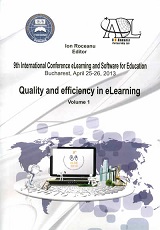WESTERN TECHNOLOGICAL AND CULTURAL DETERMINATION OF E-LEARNING
WESTERN TECHNOLOGICAL AND CULTURAL DETERMINATION OF E-LEARNING
Author(s): Margareta BoacăSubject(s): Education
Published by: Carol I National Defence University Publishing House
Keywords: cultural determination; technological determination; western cultural values; e-learning strategies
Summary/Abstract: Awareness of the cultural dimensions of the e-learning process is part of the wider trend that is characteristic to the contemporary epoch and which increasingly highlights the multiple and profound ways in which culture determines the values and needs, actions, attitudes, patterns of thought of people. In the specific context proposed for debate by the present scientific meeting, culture plays an important role in determining the ways in which teaching and learning are supposed to develop in a certain society. An important part of the cultural dimension of e-learning is related to the way in which e-learning is perceived and works in certain cultural environments. It is the purpose of my article to highlight the very cultural determination of e-learning per se, as a form of learning that has been developed in western societies. Technology changes human condition. On the one hand, e-learning is the result of the creation of western technologies, so it has a strong cultural weight by promoting the use of that technology and associated cultural realities. On the other hand, as a form of education it promotes content that is generated in a specific cultural reality, it is permeated by assumptions of what learning and teaching are supposed to be, it is structured on western theories on learning and western cultural values, notably individualism, strongly related to the western understanding of the role and responsibility of the individual in his/her own learning and development. E-learning springs from western cultural values which have to be in place in order for that process to be efficient. Frustration and distrust in e-learning as a learning method are the result of cultural differences as regards the dimensions of power distance and individualism /collectivism. Awareness of the cultural determination of e-learning and of its perception by non-western students is vital in increasing its efficiency as a learning tool.
Journal: Conference proceedings of »eLearning and Software for Education« (eLSE)
- Issue Year: 9/2013
- Issue No: 01
- Page Range: 350-355
- Page Count: 6
- Language: English

